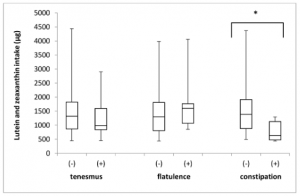The intake of lutein and zeaxanthin is associated with lower incidence of constipation or other gastrointestinal symptoms in Caucasian individuals with ulcerative colitis.
The aim of this observational study was to analyze the association between retinoid intake (total vitamin A, retinol, β-carotene, α-carotene, β-cryptoxanthin, lycopene, as wellas lutein and zeaxanthin) and self-reported gastrointestinal symptoms (daily number of bowel movements, and the presence of painful tenesmus, flatulence, and constipation) in Caucasian individuals in the remission phase of ulcerative colitis.
To do so, 56 ulcerative colitis remission individuals were recruited and retinoid intakes were analyzed on the basis of three-day dietary records.

Box plots of lutein and zeaxanthin intake in groups of individuals stratified by the analyzed symptoms of tenesmus, flatulence and constipation. (-) symptom not declared; (+) symptom declared.
Results showed that one in every seven individuals reported recurring constipation. Higher intake of lutein and zeaxanthin may lower the incidence of constipation (p = 0.013).
Authors concluded that the intake of retinoids other than lutein and zeaxanthin was not associated with the incidence of constipation or other gastrointestinal symptoms.
Głąbska D, Guzek D, Zakrzewska P, Lech G. Intake of Lutein and Zeaxanthin as a Possible Factor Influencing Gastrointestinal Symptoms in Caucasian Individuals with Ulcerative Colitis in Remission Phase. J Clin Med. 2019 Jan 11;8(1). pii: E77.
